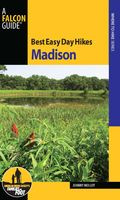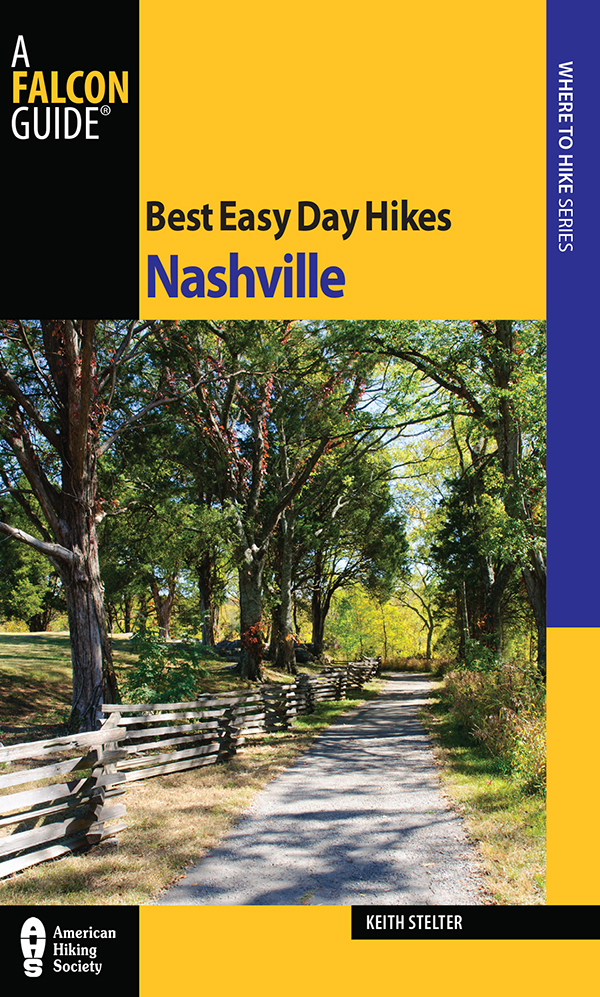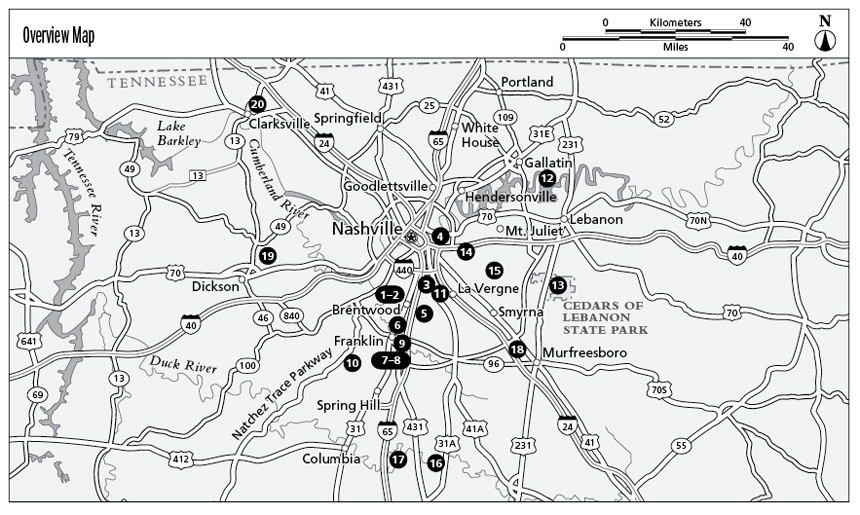Best Easy Day Hikes Series
Best Easy Day Hikes Nashville
Keith Stelter
Help Us Keep This Guide Up to Date
Every effort has been made by the author and editors to make this guide as accurate and useful as possible. However, many things can change after a guide is publishedtrails are rerouted, regulations change, facilities come under new management, etc.
We would appreciate hearing from you concerning your experiences with this guide and how you feel it could be improved and kept up to date. While we may not be able to respond to all comments and suggestions, well take them to heart and well also make certain to share them with the author. Please send your comments and suggestions to the following address:
GPP
Reader Response/Editorial Department
P.O. Box 480
Guilford, CT 06437
Or you may e-mail us at:
editorial@GlobePequot.com
Thanks for your input, and happy trails!
Copyright 2011 by Morris Book Publishing, LLC
ALL RIGHTS RESERVED. No part of this book may be reproduced or transmitted in any form by any means, electronic or mechanical, including photocopying and recording, or by any information storage and retrieval system, except as may be expressly permitted in writing from the publisher. Requests for permission should be addressed to Globe Pequot Press, Attn: Rights and Permissions Department, P.O. Box 480, Guilford, CT 06437.
FalconGuides is an imprint of Globe Pequot Press.
Falcon, FalconGuides, and Outfit Your Mind are registered trademarks of Morris Book Publishing, LLC.
TOPO! Explorer software and SuperQuad source maps courtesy of National Geographic Maps. For information about TOPO! Explorer, TOPO!, and Nat Geo Maps products, go to www.topo.com or www
.natgeomaps.com.
Maps created by Mapping Specialists Inc. Morris Book Publishing, LLC.
Project editor: David Legere
Library of Congress Cataloging-in-Publication Data is available on file.
ISBN 978-1-4930-0528-4
The author and Globe Pequot Press assume no liability for accidents happening to, or injuries sustained by, readers who engage in the activities described in this book.
Contents
The Hikes
Acknowledgments
Many people helped make this book possible, and a few went beyond the call of duty. Thanks to Mark, Scott, and Kay Stelter for their encouragement, ideas, patience, and proofreading; Nate Enloe for his general help; and Kevin Stelter, Olivia and Justin Stelter, and Shae Simpkins with Madison for hiking and journaling with me. Special thanks to Kay and Rod Heller for their Southern hospitality in allowing me to use their guesthouse as my base while in Nashville. Thanks also to Thurman Mullins, park superintendent at Long Hunter State Park. Dozens of other people provided information about the history, geology, flora, fauna, and karst areas and hikes they considered the best easy day hikes near Nashville. I appreciate their work and thank all of them.
Introduction
The purpose of this guide is to introduce readers to the variety of hiking opportunities in the Nashville area. In many hiking guides the hike descriptions are generally point-to-point narratives, getting you safely from the trailhead to the trails end and back again. However, including information on area flora, fauna, history, and geology adds a great deal of interest to many hikers, including families with young children.
Determining the best easy day hikes near Nashville was a combination of personal judgment about what level of hiker the hike was geared for and information from park staff and other hikers. Four of my favorite hikes are the varied trails at Long Hunter State Park, the interconnecting loops in Cedars of Lebanon State Park, the Greenways of Murfreesboro, and Henry Horton State Park trails. Hiking city and county trails offers a different experience from hiking in state parks and on backcountry trails. Most of the city trails are multipurpose and paved; a few are lighted at night, creating an entirely new hiking experience. Hiking these trails can also offer a distraction from the city itself, with its busy streets, buildings, and commerce. Surprisingly, many of the trails are in wooded areas, providing an unexpected degree of solitude.
The Nashville Parks and Recreation Departments trail system spans more than 60 miles. Enjoy the experience of hiking in middle Tennessee. The great ecological diversity of the territory, along with the flora, fauna, and karst geology, allows you to fashion trips that are much more than just hikes in the woods. Some of the city hikes (trails) take place on sidewalks, some of which have been widened from the conventional 4 feet to as much as 13 feet. This allows many different people to use themand some have been designed as traffic lanes (still called trails) to accommodate commuters walking and biking to work as well as recreational hikers.
The Nature of Nashville
Hiking around Nashville is more than walking along rivers. Trails can be found in woods, forests, nature sanctuaries, downtown, or along an Army Corps of Engineers lake. Some are busy with hikers, joggers, and cyclists; others are secluded and far from downtown.
Weather
The Nashville climate is humid, with hot summers and cool winters. The area can experience snowfall, but the white stuff is usually gone the next morning. March signals the start of spring, with warmer weather and colorful displays of flowering trees and shrubs. From March until mid-May, temperatures average between 45 and 70 degrees. Summer brings warmer weather accompanied by high humidity. The relative humidity in Nashville is 83% in the morning and 60% in the afternoon. Mid- to late October has cooler temperatures that encourage brilliant fall colors. The average low temperature (37 degrees) occurs in January, and the average high (80 degrees) in July. The average yearly rainfall is 48.1 inches. The wettest month is May, averaging 5 inches. The driest month is October, with 2.87 inches of rain. Except for high temperatures in July and August and possible showers in May, the weather for hiking in Nashville is great.
Critters
Youll encounter mostly benign, sweet creatures on these trails, including deer, squirrels, rabbits, wild turkeys, and a variety of songbirds and shorebirds. More rarely seen (during daylight hours especially) are coyotes, raccoons, and opossums. Deer in some of the parks are remarkably tame and may linger on or close to the trail as you approach.
Nashvilles parklands also are habitat for copperheads, water moccasins, and rattlesnakes, all venomous snakes. Encounters are infrequent, but you should be prepared to react properly if you run across a dangerous snake. Snakes generally only strike if they are threatened. You are too big to be dinner, so they typically avoid contact with humans. Keep your distance and they will keep theirs.
Safety and Preparation
Hiking in the Nashville area is generally safe. Still, hikers should be prepared, whether out for a short stroll along the Cumberland River waterfront or venturing into the forested Natchez Trace trails. Here is some specific advice:
Know the basics of first aid, including how to treat bleeding, bites and stings, and fractures, strains, and sprains. Pack a first-aid kit each time you head out for an excursion.






